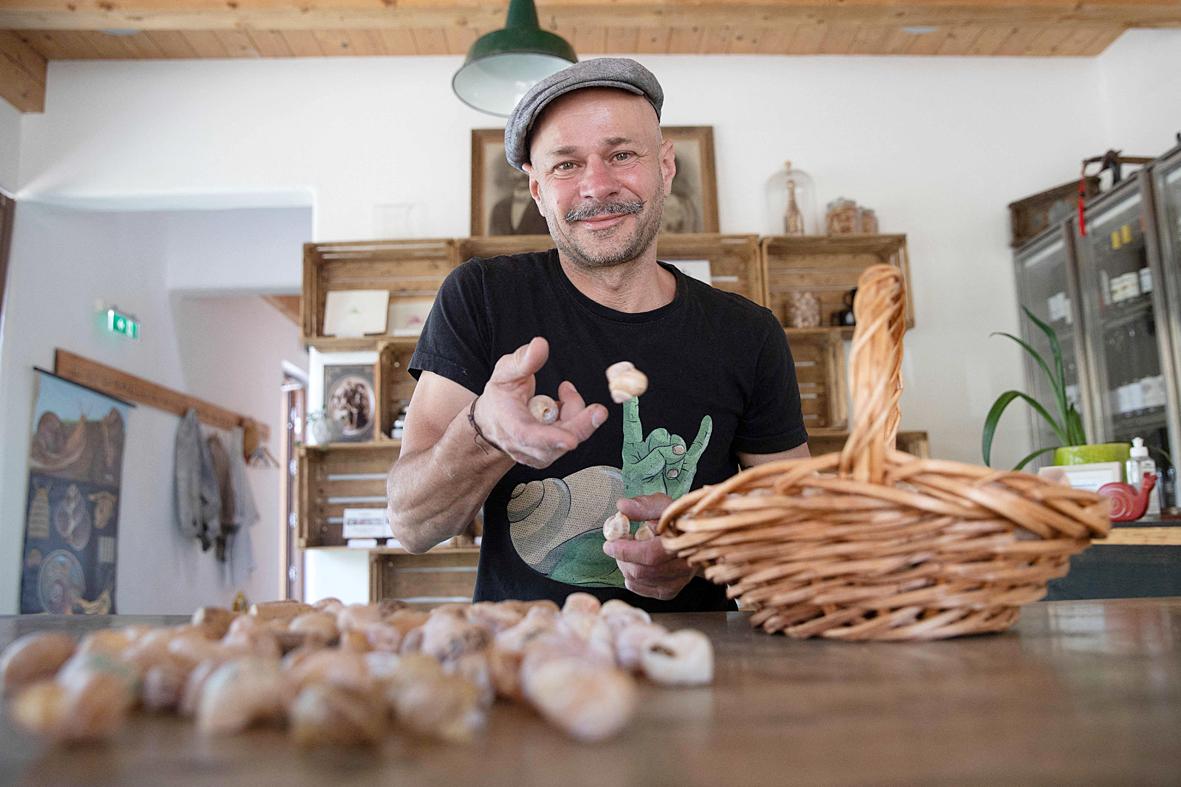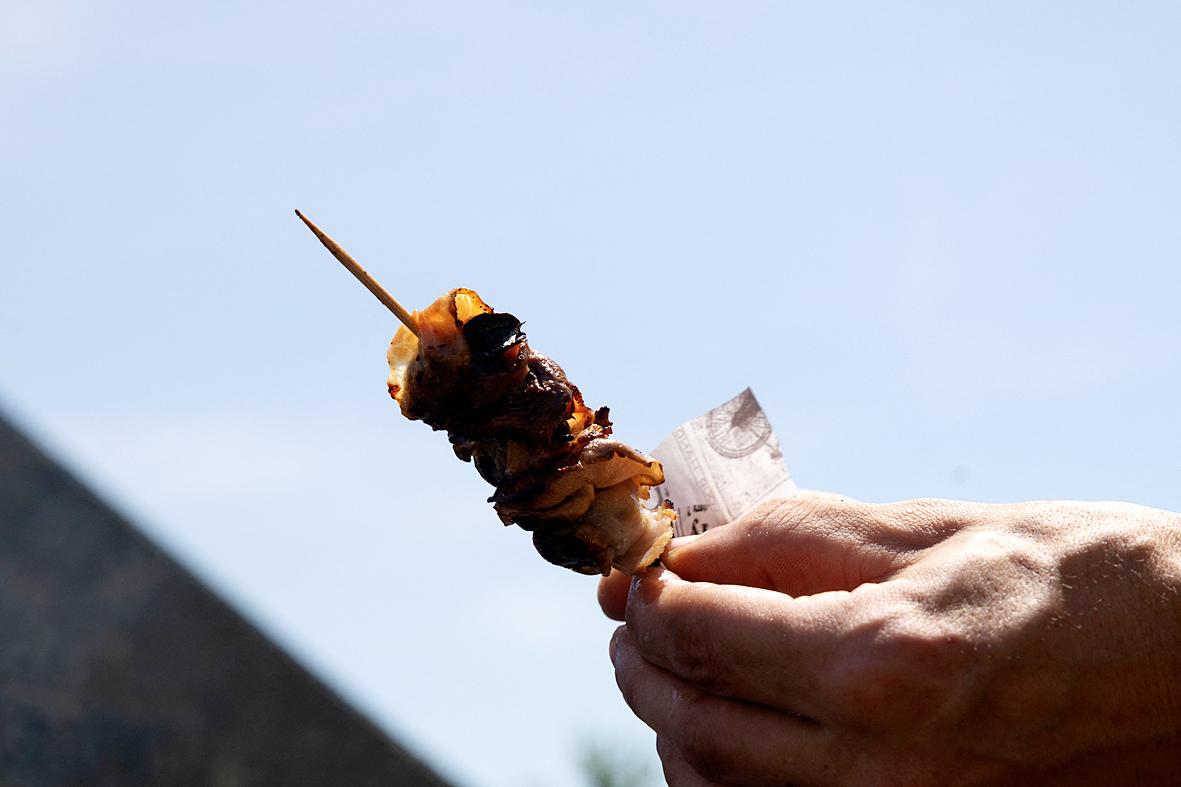On the outskirts of Vienna, farmer Andreas Gugumuck tosses some extra cereal to thousands of snails inching over planks and lush greenery. Far from being pests, the slow-moving molluscs have become his main produce.
“It started as a joke,” said 48-year-old Gugumuck, a former computer scientist who now raises more than 300,000 snails annually in an effort to resurrect a lost culinary tradition of the Habsburg empire.
Twelve years ago, an article featuring a renowned Vienna chef serving snails piqued his interest. After some research and poring over old cookbooks, he “found out that Vienna was a real snail capital”.

Photo: AP
Back when this predominantly Catholic country strictly observed religious holidays, wealthy priests and monks were forced to give up meat during Lent and other religious holidays — and found snails to be a worthy, less sinful substitute. In the 19th century, snails gained popularity across the city of Vienna, with a market in the center serving them deep fried, sprinkled with sugar or with a side of cabbage or bacon.
Though France is well-known for its garlic and butter escargots, in Vienna, snails used to be so popular they were shipped down the Danube by the barrel load.
‘IT’S A GREAT TASTE’

Photo: AP
In Gugumuck’s restaurant next to his farm, he now serves snails in risottos and on pizzas, stuffed in dumplings, with sausages, as “snail and chips,” and even in sweet cinnamon buns. Making it in the snail business wasn’t easy, he said. He recalled how chefs around the city initially turned their noses up, thinking diners would steer clear of intimidating invertebrates.
But Gugumuck started setting up events and guided tours at his snail farm to re-establish the tradition, and today, some of those chefs look enviously at the small burgeoning enterprise which, Gugumuck said, is fully booked eight weeks in advance.
Greater awareness of meat-eating’s environmental impact has also helped boost business, Gugumuck believes. Snails need little space, water or food, but he said they are packed with four times as much protein as beef, making them “a real future food.”
For the most part, Gugumuck’s customers are pleasantly surprised.
“It’s a great taste — you have to try it,” said Patrick Filzmaier, a 33-year-old bank employee who attended a wine tasting at the farm, complete with electro music.
He likened the flavor to nuts, meat and baked goods.
“It’s small but it fills you up,” he said.

“Why does Taiwan identity decline?”a group of researchers lead by University of Nevada political scientist Austin Wang (王宏恩) asked in a recent paper. After all, it is not difficult to explain the rise in Taiwanese identity after the early 1990s. But no model predicted its decline during the 2016-2018 period, they say. After testing various alternative explanations, Wang et al argue that the fall-off in Taiwanese identity during that period is related to voter hedging based on the performance of the Democratic Progressive Party (DPP). Since the DPP is perceived as the guardian of Taiwan identity, when it performs well,

The Taiwan People’s Party (TPP) on May 18 held a rally in Taichung to mark the anniversary of President William Lai’s (賴清德) inauguration on May 20. The title of the rally could be loosely translated to “May 18 recall fraudulent goods” (518退貨ㄌㄨㄚˋ!). Unlike in English, where the terms are the same, “recall” (退貨) in this context refers to product recalls due to damaged, defective or fraudulent merchandise, not the political recalls (罷免) currently dominating the headlines. I attended the rally to determine if the impression was correct that the TPP under party Chairman Huang Kuo-Chang (黃國昌) had little of a

At Computex 2025, Nvidia CEO Jensen Huang (黃仁勳) urged the government to subsidize AI. “All schools in Taiwan must integrate AI into their curricula,” he declared. A few months earlier, he said, “If I were a student today, I’d immediately start using tools like ChatGPT, Gemini Pro and Grok to learn, write and accelerate my thinking.” Huang sees the AI-bullet train leaving the station. And as one of its drivers, he’s worried about youth not getting on board — bad for their careers, and bad for his workforce. As a semiconductor supply-chain powerhouse and AI hub wannabe, Taiwan is seeing

Jade Mountain (玉山) — Taiwan’s highest peak — is the ultimate goal for those attempting a through-hike of the Mountains to Sea National Greenway (山海圳國家綠道), and that’s precisely where we’re headed in this final installment of a quartet of articles covering the Greenway. Picking up the trail at the Tsou tribal villages of Dabang and Tefuye, it’s worth stocking up on provisions before setting off, since — aside from the scant offerings available on the mountain’s Dongpu Lodge (東埔山莊) and Paiyun Lodge’s (排雲山莊) meal service — there’s nowhere to get food from here on out. TEFUYE HISTORIC TRAIL The journey recommences with